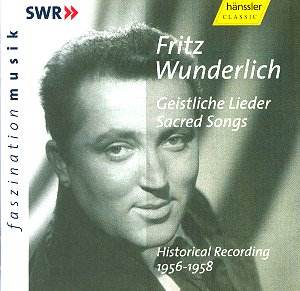|
|
Search MusicWeb Here |
|
 |
||
|
Founder:
Len Mullenger (1942-2025) Editor
in Chief:John Quinn
|
|
|
Search MusicWeb Here |
|
 |
||
|
Founder:
Len Mullenger (1942-2025) Editor
in Chief:John Quinn
|

|
Fritz WUNDERLICH
(tenor) Sacred Songs HÄNSSLER CLASSIC CD 93.025 [76.09] |
| CD available for post-free online mail-order or you may download individual tracks. For some labels you can download the entire CD with a single click and make HUGE savings. The price you see is the price you pay! The full booklet notes are available on-line. |  |
|
NOTE • Click on the button and you can buy the disc or read the booklet details • You can also access each track which you may then sample or down load. • Further Information. |
|
|
Fritz Wunderlich was one of the greatest tenors of our time second only to the great Jussi Björling who also died young.
Wunderlich was born in Kusel in 1930 and at the age of twenty-one made his debut with the Freiburg Choir. His opera debut was as Tamino in The Magic Flute in 1954. In fact his Mozart was renowned in his time. He created the role of Tiresias in Orff’s Oedipus der Tyrann in 1959. He recorded Mahler with Klemperer. He was also very good in operetta which suited his lyric voice. He died in 1966 in a tragic fall.
On this welcome CD we don't have sacred songs as such but extended religious vocal works by Schütz, Rosemuller, Graupner, Telemann, Buxtehude and Krieger. In the first two items he is joined by another tenor, Bernhard Michaelis who also appears in. the Rosenmuller, Graupner and Kreiger. The soprano Margot Guilleaume and the contralto Hanne Munch join him in the Graupner as well and the bass, Hermann Werdemann appears in the Buxtehude. There are small instrumental ensembles as accompaniments.
The first Schutz piece is Es steh Gott auf, dass seine Feind zerstreut werden called a German concerto (!) for two tenors, two violins and bass continuo, SWV 356. This is a notable performance with an enviable clarity of line. Perhaps the voices are occasionally slightly harsh in comparison to the exceptionally warm string sound. But it is wonderfully evocative music. The atmosphere is very well caught. The slow final section is strangely beautiful. I do admire the lack of fussiness in the performance, no elaborate and ghastly ornaments and no heavy treading bass and all those other eccentricities which some performers use which ruin and, indeed, caricature early music.
Another Schütz cantata, Was betrubst du mich, meine Seele, SWV 353, for the same forces follows. This is a more introspective piece but also very beautiful a word seldom used for early music.
The Rosenmuller is Three lessons from the Lamentations of the prophet Jeremiah but it is an arrangement by one Fred Hamel. Here Wunderlich is the sole singing voice and so one can marvel at his lovely tone and clarity and the security of his intonation. The music is rather sparse and twenty minutes of sad music takes more stamina than I have but it does serve to reveal a very special voice.
Christoph Graupner was born in Hartmannsdorf in 1683 and died in Darmstadt in 1760. He wrote nine operas, over 100 symphonies (so it was not just Haydn who wrote so many symphonies), 50 concertos and well over fourteen hundred pieces for church use. This cantata, Wie bald hast du gelitten for four voices, strings and harpsichord was written for New Year's Day 1714. It is a very effective little work which shows how Wunderlich blended so well in an ensemble. One could easily fall in love with this charming piece which captures the magic of the seasons it represents. The soprano is excellent.
This is how early music should be performed.
I have often wondered whether Telemann is a greater composer than Bach. This cantata Warum verstellest du die Gebarden is typical of his style. While the great Bach was very academic and intellectual I find Telemann's music more emotive, more from the heart and Wunderlich expresses this to perfection. The oboe obbligato played by Fritz Fischer is sheer delight.
I have a lot of time for Dietrich Buxtehude: the Danish composer and organist. Bach walked 200 miles to hear him play. It may be true to say that none of his works have really caught on but the elegance of O wie selig, die zu dem Abendmahl des lammes benufen sind is exquisitely performed here without fuss and affectation. The combination of tenor and bass works very well.
Johann Philipp Krieger lived from 1649 to 1725 and his German concerto for two tenors and bass continuo completes this disc.
There is much to admire here although the music is all occasional pieces. It is a fitting tribute to a great singer and the choice style of performing early works in the last 1950s.
But why isn't all early music performed like this in this simple, direct unostentatious way?
|
Was betrubst du dich, meine Seele J. ROSENMULLER Lamentation
for the Thursday of the Passion Week Lamentation for the Friday of the Passion Week C. GRAUPNER G.P.
TELEMANN D. BUXTEHUDE J. KRIEGER Get a free QuickTime download here |
|
ADDITIONAL INFORMATION •
You can sample only 30 seconds (or 15% if that is longer) of a given track. Select from the View tracks list. Each sample will normally start from the beginning but you can drag the slider to any position before pressing play. • PLEASE NOTE: If you are behind a firewall and the sound is prematurely terminated you may need to register Ludwig as a trusted source with your firewall software.
•You will need Quicktime to hear sound samples. Get a free Quicktime download here • If you cannot see the "Sample All Tracks" button you need to download Flash from here.
|
|
|
Return to Index |